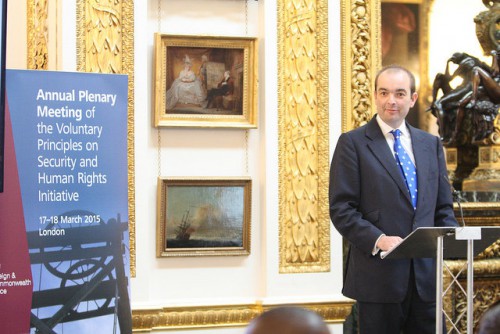17th March 2015 London, UK
Guest blog by Kirstie Smith, Business and Conflict Desk Officer, Conflict Department, on the UK’s Chairmanship of the Voluntary Principles on Security and Human Rights
I’m delighted to host this blog from Kirstie Smith, and grateful to her for approaching me with the suggestion. The Voluntary Principles (VPs) – and the UK’s support for them – are a good example of the UK’s pursuit of fairness. That can sound lofty, especially when we talk about how human rights, prosperity and security are mutually reinforcing. But we much prefer hands-on, practical efforts to better the lot of workers, communities, companies and the economy as a whole. The VPs are a way to do this in the extractives sector. Our equally strong support for the UN Guiding Principles on Business and Human Rights (BHR) is our attempt to find win / win solutions in all sectors of the global economy. BHR is one of only six FCO thematic human rights priorities. We were the first country to publish a National Action Plan on BHR. This week’s meetings on the VPs are an example of the UK “walking the talk”.
Guest Blog by Kirstie Smith
When I tell people that I work on the Voluntary Principles (VPs) on Security and Human Rights, I often get blank looks. The VPs are not well known outside of the extractive sector, but they are widely used and play an important role. They provide guidance for oil, gas and mining companies to manage security and human rights risks where they operate. UK companies like BP, Rio Tinto and Shell use the VPs as a matter of course. Small and medium size companies are starting to follow their lead. They tell us that they use the Principles because they are a useful tool to manage risks, and because “it is the right thing to do”. And it helps them to meet their commitments under the UN Guiding Principles on Business and Human Rights, which set the bar for how governments and companies should approach the relationship between business and human rights.
The public would be the first to hear if extractive companies were not managing security risks effectively. Back in the nineties, several large extractive companies faced allegations of complicity in human rights abuses carried out by local police protecting their sites in countries like Nigeria and Colombia. There, security officers used lethal force to manage peaceful protests by local communities, and companies suffered serious financial and reputational damage as a result. This is one of the reasons why we co-founded the VPs fifteen years ago. The initiative currently includes nine governments, 28 extractive companies and ten NGOs. We want more to join us. The initiative provides a space for these participants to discuss security and human rights challenges and share best practice.
We want to make the VPs even more effective. That is why we have been chairing the initiative over the past year. I have played a leading role, setting our chairmanship priorities and steering the overall direction of the initiative. I have really enjoyed the challenge. Moments which stand out for me have been the opportunities to engage with governments directly to raise awareness of the VPs – with more governments on board, the easier it is for UK companies to manage risks. I have organised and delivered workshops in Africa, and discussed with a wide range of stakeholders in country how we might strengthen implementation of the VPs – seeing how they are working on the ground in countries like Tanzania and Mozambique have really helped me to understand the challenges that companies face. And if there are fewer injuries and fatalities caused by security officers around extractive operations as a result of the VPs, then that makes it all worthwhile.
We have made good progress during our chairmanship. Ghana became the first African government to join last year, and Angola has also since committed to joining. We have strengthened dialogue between governments, companies and local communities in several countries including Kenya, Tanzania, Angola and Peru, and we have worked to bring the VPs more into line with the UN Guiding Principles, by encouraging companies to be more open about how they are using the VPs.
This week, we will conclude our chairmanship by hosting the VPs annual plenary meeting for around 150 people in London. For me, this will be a personal highlight of our chairmanship. Our plenary will be an important opportunity to showcase the VPs to invited governments, and to provide a platform for participants to discuss how the Principles are being used. Following the Plenary, the US will take over the chairmanship. We look forward to working with them and others to support companies to manage risks more effectively, as the initiative continues to go from strength to strength.
